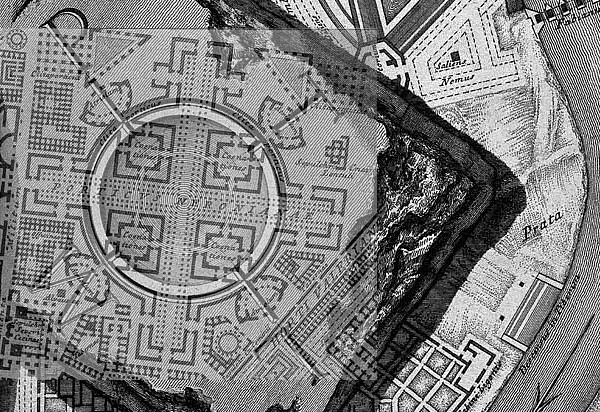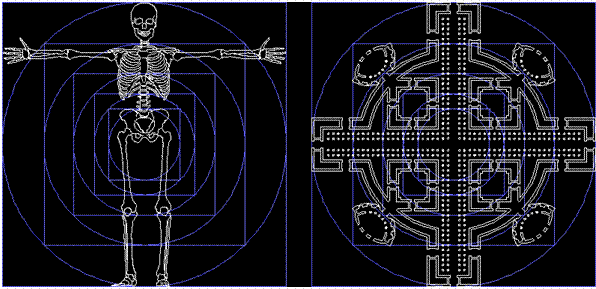2000.12.18
where does concept come from
The Latin word 'concepto' (a verb) means: (1) to conceive, become pregnant and (2) to conceive in mind.
The Latin word 'conceptio' (a feminine noun) means (1a) a comprehending; hence concretely, a circuit, compass: the system of the universe [and here Vitruvius is cited as the source of the concrete meaning] -- (1b) a collection, reservoir -- (1c) a conception, a becoming pregnant -- (2a) a composing, drawing up of juridical formulas -- (2b) an expression
From my own experience as an architecture student and as an occasional jury member of student design presentations, the notion of formulating a 'concept' early on in the design process is an integral part of contemporary architectural education. I admit that up until five days ago, when I first read the Latin definitions above, I never connected the notion of formulating a design concept with the notion of becoming pregnant (although the connection in English is surely present in the word 'conception'). For me, concept in design meant an idea formulated from the building program and site, and this idea would both guide the design process as well as provide the design with a cohesion.
Now, knowing the Latin definitions of concepto and conceptio, I change my understanding of concept vis-à-vis designing to being metaphorically that moment when the design process becomes pregnant. And here I want to recall Saul's question "whether there are any arguments for a language of architecture that go beyond appeals to a metaphorical sense of 'language'. [What follows is not to refute Saul's quest, which I see as an insightful mind seeking an interesting and seemingly unprecedented vein of thought, but to suggest what might be the very root of the opposite of what Saul seeks--working with the logic(?) that to understand what something is not will aid in understanding what something is.]
It seems fairly clear that the notion of mentally attaining a concept is already a metaphor for physically becoming pregnant (and here I wonder whether the age old male striving for intellectual dominance is really nothing more than womb envy), hence a substantial part of design/creativity language is likewise purely metaphorical. Again, I'm not trying to suggest that a non-metaphorical language of architecture cannot be found or formulated, rather to point out that the concept of a non-metaphorical language is either: (1) already operating metaphorically in that mental conception reenacts physical conception, or (2) a non-metaphorical language of architecture is one that seeks to equal physical conception itself (i.e., to enact rather than reenact).
| |

Last week I offered "innuendo" as a "display [that generally] deals with the 'language' and meaning of architectural planimetric forms, while specifically [displaying] the 'master key' that unlocks the long held mysteriousness of Piranesi's Ichnographia Campus Martius." Take another look at innuendo/0001 because you will see a 'building' that is both literally and figuratively conception. This tiny building is indeed one of the few plans within the Ichnographia that Piranesi does not provide with a Latin label, and that is because the building, through its plan, already speaks for itself, and, moreover, it speaks of all the 'concepts' there involved, namely, Piranesi's conception of architectural language and the very conception of Rome [Romulus] itself. Piranesi's architectural intensification here is so tight to the point that indeed the medium is the message. And I now wonder whether it might be more worthwhile to seek a language of architecture where the medium is the message, or is such a 1=1 language the same as "a language of architecture that goes beyond appeals to a metaphorical sense of 'language'?"
| |
2000.12.23
Do dictionaries help us understand?
Tad offers:
So, let me offer an experimental definition of 'concept.' A concept is the result of an insight, and the base for a word, an explanation, or a design. First, it's the result of an insight. That is, it issues from the act of understanding, getting the point, grasping an order, putting two and two together, designing, interpreting, getting an answer to questions Why or How. The insight is an event, an occurrence. You get my meaning here not by looking up all my words, but by consulting your experience of understanding anything.
Steve asks and states:
Tad, did not your experiment above just reenact the general definitions of the Latin 'concipio', the word from which the English word concept comes from?
The definition of 'concipio' is to take or lay hold of, to take to one's self, to take in, take, receive, and (1B1) to take or receive fecundation, to conceive, become pregnant, and (2A) to take or sense or seize something by the sense of sight, and (2B1) to perceive in mind.
Is not your "result of an insight" a reenactment of "to take or sense or seize something by the sense of sight," and is not your "grasping an order" a reenactment of "to take or lay hold of," and is not your "putting two and two together," a reenactment of "to conceive, become pregnant?"
Can you honestly say that your experiment did not just repeat the Latin 'understanding' of 'concipio'?
For me, your experiment did not reveal anything new about 'concept', rather something very old about 'concept'.
For what it's worth, I am looking at the Latin words 'concipio' AND 'capio' (whose definition is like 3 pages long) to first find out where words and meanings came from. If a heightened understanding emerges from this research, so much the better. Even without some newly arrived at understanding, at least I will have learned the 'history' of the words. It is already very clear to me that this research into the 'origins' (and I'm using this word here more for convenience, rather than for philosophical reasons) of 'concept' is indeed a fecund and fruitful thing to do.
Tad, that's one experiment done. I think we would all benefit if you conducted several more.
| |
2013.12.18 20:24
18 December
Reading 'conceptio' (a feminine noun) means (1a) a comprehending; hence concretely, a circuit, compass: the system of the universe [and here Vitruvius is cited as the source of the concrete meaning] again today made me wonder anew as to the significance of the compass of the Ichnographia matching exactly the plan of the Porticus Neronianae.

Was Piranesi covertly delineating the "system of the universe?"

|